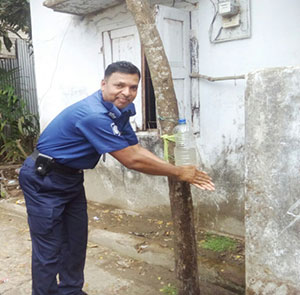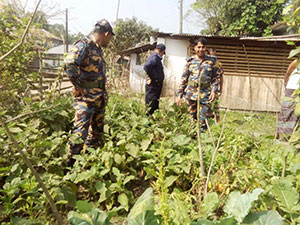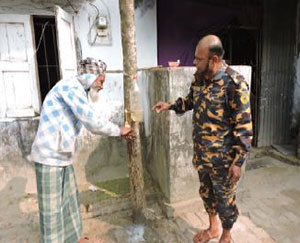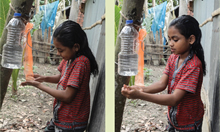
 In Morrelganj upazila, Officer Islam tours the vegetable garden that has improved nutrition for police officers.
In Morrelganj upazila, Officer Islam tours the vegetable garden that has improved nutrition for police officers.
 Another member of the camp, Officer Alim, teaches police camp neighbors how to use tippy taps and install them in their own homes.
Another member of the camp, Officer Alim, teaches police camp neighbors how to use tippy taps and install them in their own homes.
The officers at Mohishpura Police Camp in Morrelganj upazila of Khulna Division faced the same problem as millions of other Bangladeshis—without convenient access to clean water and soap in bathrooms and kitchens, they didn’t wash their hands. As a result, they suffered from illnesses such as diarrhea and parasitic infections, which can hamper proper nutrition.
That was before Officer Faridul Islam noticed something interesting while on patrol near one of the farmer nutrition schools (FNS) managed by SPRING. He had come upon a “tippy tap,” a handwashing device made from a discarded water bottle that can be installed almost anywhere—just the solution the police camp needed to practice hygienic handwashing.
SPRING’s Union Facilitator, Shewli Akhter, was happy to show Officer Islam how to construct and use a tippy tap. With Akhter’s help, Officer Islam installed two tippy taps near the camp kitchen and toilet. After he explained to other officers how and why to use the tippy taps, camp hygiene and general health began to improve.
We used to use river water whenever we would go to the bathroom, and sometimes we would wash our hands using it… but it is too far away! Now we use the tippy tap to always, always wash our hands because it is the best way to save water and to stop germs from spreading.
—Faridul Islam, Assistant Sub Inspector and Camp In-Charge
That’s not all Officer Islam learned from the FNS. It also inspired him to plant a camp vegetable garden so that officers could eat more nutritious, diverse foods. Using improved agriculture practices he learned from FNS members, Officer Islam now grows 10 types of vegetables.
News about the changes in the police camp spread fast throughout the nearby community. Soon tippy taps and kitchen gardens appeared in neighboring households while officers gave advice and counsel with SPRING support. This is the unique benefit of the FNS model, which is designed to have a broader impact than improving only the health and nutrition of participants. The presence of the schools and graduates in communities has resulted in greater reach to people like Officer Islam.
SPRING’s research shows that the FNS approach is effective. A 2014 study revealed that, in FNS households, family members washed their hands 42 percent of the time compared to just 10 percent in non-FNS households.
These officers, along with women who formally participated in FNS, have become ambassadors for nutrition and hygiene in their communities and households, delivering nutrition messages to mothers, wives, and children, who are often the most vulnerable to disease. The changes in Camp Mohishpura exemplify SPRING’s commitment to community-based solutions that are simple to use and easy to spread.
More than 126,000 women have benefited from more than 6,400 SPRING-implemented farmer nutrition schools across 40 upazilas in Barisal and Khulna since May 2012. SPRING/Bangladesh facilitates social and behavior change to prevent stunting in young children by focusing on nutrition during the critical “1,000 days” from pregnancy through the first two years of life.
All photos: SPRING/Bangladesh
